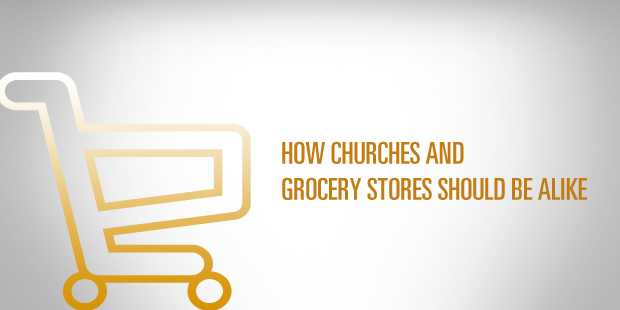
How Churches and Grocery Stores Should Be Alike
I have plenty of reasons not to love my neighborhood grocery store: it’s not as cheap as Wal-Mart or Aldi; the fruit’s not as fresh as that big fruit market; it’s not trendy or hip at all like Trader Joe’s or Whole Foods; there’s no little cafe; there’s not an over-abundance of organic or grass-fed or free-range or hyper-local; and, when I was little, my father worked for its parent company and got laid off. So I should maybe be bitter or judgmental or snobby or a better steward or something. And yet, I can’t.
I love that store – “the Jewel,” as we call our Jewel Food and Drug store. Amid the mocking from friends who can’t believe I still shop there and in this increasingly competitive world of supermarkets clamoring to meet our every wish and to beat each other’s prices, I cheer for it. Go Jewel!
Truth be told, of course, it’s not exactly the Jewel itself I’m cheering. And I get why my friends prefer other stores – based on price, on quality, on variety, on ethical concerns. I understand why other stores have successfully chipped away at the mighty market share the Jewel once enjoyed. As grocery-store analyst David Livingston has said, when chains like the Jewel sought to become more efficient, they “lost sight of what their customers wanted from them.” And when my friends wanted cheaper or organic or larger variety, the Jewel failed them.
Beyond that, Livingston said stores like the Jewel lost customers because, in seeking efficiencies above all, they got rid of the “human experience” element of grocery shopping. “[The supermarket chains] piled it high and sold it cheap,” Livingston told the Chicago Tribune, “…got rid of all the humanity. It’s food. It’s primal. Yes, we need it to live, but we love it.”
“Folks from all walks of life, from all backgrounds, coming to a place based on a deeply primal need: to seek the sustenance of grace, the Bread of Life”
Livingston makes an interesting point. But I respectfully disagree with his definition of “human experience.” I don’t know anything about supermarket efficiencies, but I do know about the “humanity” of which Livingston speaks. And to that end, it’s because of its humanity that the Jewel has kept me as a loyal customer through the years. This neighborhood store is nothing short of a human experience – the human experience in many ways.
It’s the place where I bump into and catch up with neighbors and kids and teachers from school. It’s the place where I chat with cashiers and bakers and deli ladies and baggers who have worked there for the decades that I’ve shopped there. It’s the place where the produce guy smiles every time he sees my youngest child’s chocolate-smeared face from the donut I let him eat (and pay for via an empty bag later).
It’s probably the most racially and economically and religiously diverse place in town. And yet, it’s a place where we all come based on a need steeped in our shared, created humanity: a primal need to eat and a creative need to make what we eat interesting. I love that we meet this primal need together, locally.
In many ways, I believe every trip to the local grocery store is what every trip to local church should be. Folks from all walks of life, from all backgrounds, carrying all sorts of stress and burdens with them, coming to a place based on a deeply primal need: to seek the sustenance of grace, the Bread of Life, and to meet a creative need to make our worship interesting. Like the supermarket, sometimes the “cost” of attending a certain church is a bit higher than we’d like, sometimes the “fruit” isn’t quite as fresh or the ambience quite as trendy. Too often we’re tempted to shop around, to find something better, something more likely to meet our every last whim.
But when we look at churches or grocery stores or whatever as part of our human experience – as part of collectively meeting our primal needs – somehow those tiny whims and fancy trends seem much less important. Certainly less important than neighbors gathering with neighbors, serving, seeking, meeting those needs – creatively and collectively.
This article originally appeared on ThinkChristian.net.

Tags: Caryn Rivadeneria, Physical space, Worship











